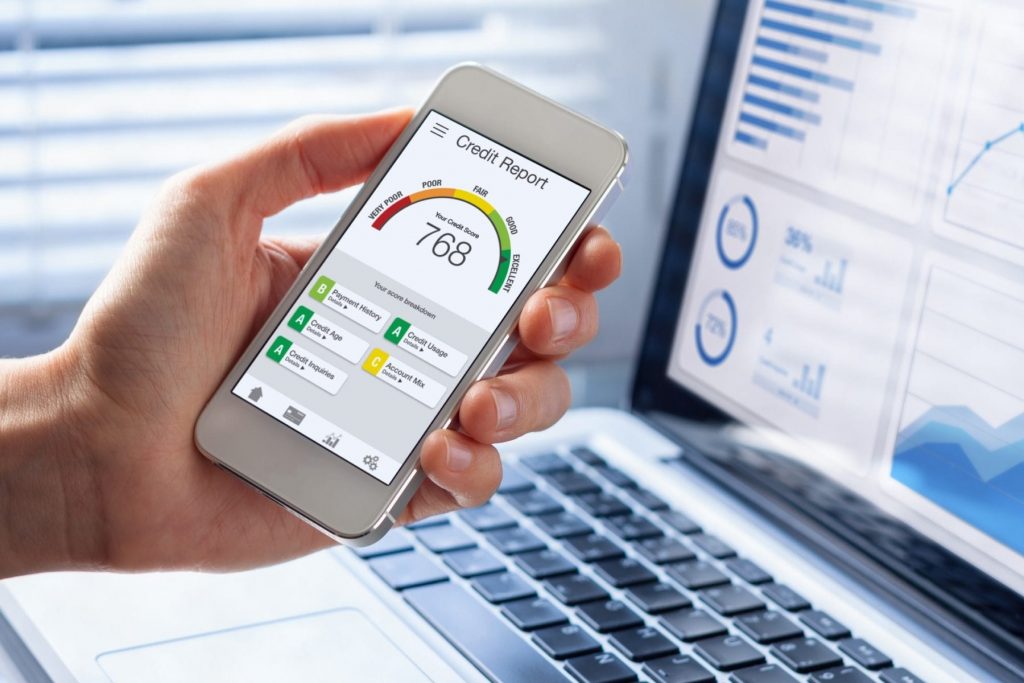My Credit Score Dropped But There Were No Changes On My Report
Your credit score is calculated based off the information in your credit report. To create your score, the information is broken down into different categories or factors. These factors may be weighed differently based on their importance. For instance, your payment history and utilization tend to carry the most weight in calculating your score.
You Applied For New Credit Recently
Every time you apply for a new credit card or loan, you could lose a few points on your score. Thats true whether youre offered and accept the credit product or not. The reason? Multiple credit applications are associated with a higher risk that you wont pay as agreed, and higher risk equals lower score.
If your score suffered from too many credit applications, the solution is to stop applying. The hard inquiries when someone checks your credit because you have applied for credit disappear from your credit report after two years. Even better, the effect on your credit fades much sooner than that.
When you do decide that it’s time to apply for a new credit card, make sure to research which ones best fit your financial needs, and which you’re eligible for based on your current credit score.
Derogatory Remarks On Your Credit Reports
Since your based on information in your credit reports, negative information can drag your score down. For example, if you have a bankruptcy listed on your reports, it can have a negative effect on your score for a long time. A Chapter 7 bankruptcy remains on your credit report for up to 10 years while a Chapter 13 bankruptcy remains on your report for up to seven years.
Some other examples of derogatory remarks that can lower your credit score include collection accounts and foreclosures. An original debt creditor usually sends your account to collections after failing to collect a debt from you. A foreclosure happens when you default on your mortgage. These negative remarks remain on your credit reports for up to seven years.
Although a derogatory remark can stay on your credit report for up to ten years, its impact lessens over time. Also, practicing good credit habits can help you rebuild your credit faster.
Read Also: Does Being A Loan Guarantor Affect Your Credit Rating
Pay Before Issuer Reports
Okay, we need to break this one down a bit. Issuers report payments to the 3 credit bureaus every 30 days, but the date they do this varies. Meaning, if you make your payment on the due date of the 27th every month, but they report on the 23rdyou look like youre always carrying a high balance.
Simply put: call the insurer, find out the date they report payments and make your payment at least a few days before this date.
You Applied For Credit But Your Application Was Denied

Applying for a loan or credit card, whether your application is approved or denied, the resulting hard inquiry could damage your credit score slightly.
As we just mentioned, when you apply for credit, the lender usually has to do a hard pull on your credit report to see if you qualify.
This doesnt always result in a new credit account being opened. Sometimes, for example, your credit application might get rejected by the lender, or perhaps you may choose to decline the terms you were offered and not proceed with opening the account.
Unfortunately, even if you didnt actually end up opening a new account, the fact that you applied for credit can still hurt your score. The hard inquiry still goes on your credit report whether you opened an account with that lender or not.
If you only applied for one account, then your credit score will likely only fall by a few points, if at all. If you applied for several accounts that you didnt open within the past year, however, its possible that you could see a bigger dip in your score as a result of all of those inquiries on your report.
Also Check: When Does Chapter 13 Bankruptcy Fall Off Credit Report
What To Do When Your Credit Score Drops
Your credit score has dropped and youre feeling nervous about your financial situation. Lets work on fixing this immediately.
Here are 4 things that you can do to improve your credit score right now:
- Go over your free credit report and look for errors that you can dispute. Ensure that everythings accurate on your credit report. Do this semi-annually.
- Increase your credit limit. Can you try to increase the limit on one of your credit cards? However, this doesnt mean you should spend more! The goal is to increase the limit without using the credit so that you can improve your credit utilization ratio.
- Apply for more credit. You may want to consider applying for a new credit card with no annual fees to boost your credit diversity and improve your credit history.
- Set up automated payments. The goal should be to never miss a payment deadline again. The best way to do this is to automate your payments.
If you can pinpoint the mistake and you know how to resolve it, then theres nothing to stress about. All you can do is work on making the changes to improve your credit score promptly.
The only thing I would consider is waiting before applying for another loan. If your credit score is lower than youd like, you may want to reconsider applying for that mortgage right now.
Related: 7 Ways to Improve Your Credit Score
Your Credit Limit Has Been Reduced
Many people think that if their credit card company offers them a high credit limit, they should ask for it to be reduced, which will have a positive effect on their credit scores. Actually, it could have the opposite effect on their credit report.
While maxing out a credit card will result in your score dropping, decreasing your limit will also affect your good credit rating if your balance stays the same. This is because it reduces your credit utilisation ratio due to a lower overall limit across all your credit cards.
You May Like: Keyword
Youre Comparing Different Credit Scores
You may think that you have just one credit score, but the reality is that you have a few. So, when tracking your score over time, be sure youre comparing the same type of credit score.
First, look at the credit model. The two most popular ones youll find are FICO® and VantageScore. Score models update periodically, resulting in new versions. Next, check the version of that model to ensure, for example, that youre tracking FICO® Credit Score 8 consistently and not looking at FICO® Score 9 by mistake.
Your Credit Utilization Ratio Has Increased
If youve made a large purchase recently using credit, this can cause your credit score to fall. Thats because it can increase your , which accounts for 30% of your FICO score. In general, the lower your credit ratio utilization, the better your credit score.
Your credit utilization ratio measures how much credit you use versus how much you have available. For example, if you have a $5,000 balance and your total credit limit is $20,000, your ratio is 25% .
Although its often recommended to keep your credit utilization ratio at or below 30%, keeping it closer to 0% could help you improve your score or build credit.
You May Like: How Long Do Things Last On Credit Report
When Should You Worry About A Dropping Credit Score
Did your score shift unexpectedly? A few points difference from month to month is nothing to worry about. But major movement is worth investigating.
First, review any documentation that comes along with your credit score. Many reports offer a listing of negative factors dragging down your score. Have any of those factors changed since the last time you saw your score?
Second, look at your account activity on loans and lines of credit. Did you accidentally pay late or miss a payment entirely? Is your balance higher than usual? And are there any suspicious charges you dont recognize on your cards?
Finally, order a free copy of your credit history report. Look for recently reported behavior that could explain the score change youve noticed. Be sure to contact the credit bureau issuing the report if you find incorrect information. Bad data may simply be an error or could indicate identity theft.
Many people worry when they see changes in their credit scores. Its true that big movement can point to a problem, but minor shifts are normal. Plus, knowing how your behavior impacts your score can make your score less mysterious while empowering you to build yourself a stellar credit history.
Get more info about what it takes to establish a credit history at the Smarter CreditTM Center.
Changes In Ficos Formula
The FICO formula changes occasionally, most recently in December 2016. The purpose is to keep up with the changing needs of consumers and lenders. As well as the standard model, there are also industry-specific versions, such as for the auto-lending industry.
Obviously, there have been several different versions of the FICO scoring model, and lenders have the option to choose which version they are going to use. Since different versions of the formula look at things slightly differently, your credit score may change if a lender begins to use a different version.
The table below shows the wide variation in the versions used by different lenders in different industries:
Read Also: Is 652 A Good Credit Score
Can You Pay Off A 72 Month Car Loan Early
Consider refinancing your current car loan Refinancing with a new 72-month loan is a relatively long time that’s six years. Instead, look for a shorter term and a lower interest rate. If you do refinance for a long-term loan, consider paying extra toward the principal every month to pay off the loan early.
Why Did My Credit Score Just Drop 6 Common Reasons

Kenadi Silcox11 min read
Your three-digit credit score can be the difference between being approved for a new financial product with strong terms versus being stuck with sky-high interest rates or worse, denied altogether. So it can be incredibly frustrating when you think youre doing well financially, only to find that your score has dropped.
that helps lenders and often landlords determine how much risk you pose as a borrower or renter. The better your credit score, the lower your interest rates and larger your credit limits will be, while the opposite is true the lower your score is. But credit scores also frequently change, and sometimes not for any obvious reason.
Scores fluctuate all the time depending on how the information in your credit history is evolving and changing, says Rod Griffin, senior director of consumer education and advocacy at Experian.
Here are the six most common problems that can lower your credit score, according to Griffin:
Don’t Miss: What Does Debt Consolidation Do To Your Credit Score
Your Credit Report Says You Missed A Payment Even Though You Paid On Time
Dispute any mistakenly reported late payments so that they dont unfairly affect your credit score.
Since payment history is the most important factor in your credit score, an incorrectly reported missed payment could severely damage your credit, especially if you are starting with very good credit. The higher your score to begin with, the more you stand to lose from a credit mistake.
This type of situation is another example that demonstrates why its so crucial to regularly check your credit report. If you always made all of your payments on time, you might assume that you must have a spotless credit record, only to find out at an inconvenient time that a creditor has been incorrectly reporting that you missed a payment.
Keep an eye out for errors like this on your credit report so that you can dispute them right away.
Why Is My Credit Score Low After Getting A Credit Card
When you apply for a credit card, the issuer performs a hard credit check to determine whether you qualify. This can cause your credit score to temporarily drop by up to five points. If you make a large purchase after receiving your new card, it can increase your credit utilization ratio. As a result, your score could drop even further.
Don’t Miss: How To Increase Credit Score To 800
Ask For A Credit Limit Increase
Give your credit card issuers a call and ask them to increase your budget. You might have to provide updated income and personal information.
This might be difficult if youve missed payments or youve been over the limit within the past 6 months to a year, but if its possible the credit increase can give you some cushion in your credit utilization. Remember, if a credit increase is available to you, this doesnt mean you should push your spending to the limit. Be smart about the increase and your card each month to keep below 30% utilization. Its worth a try!
Why Did My Credit Score Drop After Paying Off Debt
Many or all of the products featured here are from our partners who compensate us. This may influence which products we write about and where and how the product appears on a page. However, this does not influence our evaluations. Our opinions are our own. Here is a list ofour partnersandhere’s how we make money.
Making a final debt payment can feel freeing, but it wont necessarily bump up your credit score. Worse, it can actually cause a dip in your score, as counterintuitive as that may be.
To know why, its important to understand the factors that make up your credit score.
Also Check: Will A 2 Day Late Payment Affect Credit Score
There Was Fraudulent Activity On Your Accounts
Have you checked your statements lately?
An unexpected decrease in your credit score could be the result of fraudulent activity on your accounts.
If you see any charges on your statement that you do not recognize, then it could be fraudulent activity that is bringing down your score. Perhaps someone was able to obtain your credit card information by phishing or through a data breach and used it to run up the balance on the card.
Its important to monitor your credit accounts regularly so that you can catch any suspicious activity early on. Better yet, set up email or mobile notifications on your account that will alert you to fraudulent activity instantly.
If a criminal does manage to get access to your account, report the fraudulent charges to your credit card issuer immediately and ask to have the charges reversed. Most credit card companies have a zero liability policy, which means you wont be held responsible for paying for any of the fraudulent charges.
Theres A Mistake In Your Credit Report
Your credit score is based on the data in your credit reports. Credit report mistakes like a transposed number, a payment reported to the wrong account or a payment reported late when it wasnt can hurt your score.
The fix:Check your credit reports for mistakes and gather the documentation you need to dispute the errors. You can dispute online or by mail, and you will need to follow the process with each credit bureau individually.
Using a good deal more of your credit card balance than usual even if you pay on time can reduce your score that much until a new, lower balance is reported. A mistake in your credit report can also do it. Closed accounts and lower credit limits can also result in lower scores even if your payment behavior has not changed. Also, if you are certain it is for no reason, check to be sure you are not a victim of identity theft.
It actually wasn’t random. Credit scoring formulas use information in your credit reports to calculate your score. Closing an account, having your credit limit cut, charging more than normal, an error in your credit report or even identity theft can result in a lower score.
No, but it can feel that way. Scores are determined by formulas, and things like paying off a loan, having your credit limit reduced or closing an account can result in a lower score, as can a credit card balance that is higher than normal for you.
Read Also: What Is Your Credit Score
Should You Worry About Changes To Your Credit Score
Changes in your credit score are completely normal. Theres no need to worry about small fluctuations.
That being said, its good to check your credit report at least once a month so you can monitor these changes when they occur. Remember, a changing score means changing information. If you see a big change in your credit score, make sure you know what triggered it.
One Or More Of Your Credit Limits Has Decreased

Lowering your credit limit can have a negative effect on your score. This is because your credit utilisation will go up even if your spending remains the same.
So, if you normally spend £1000 of your £5000 credit limit, you have a 20% credit utilisation rate. But if your credit limit was reduced to £2000, your credit utilisation rate would suddenly increase to 50%.
Many people lower their credit limit on credit cards if they feel like they are not going to use it. This can be a sensible option if youll struggle to make repayments if you max out your limit. However, this can cause your score to drop. So its worth considering whether you need to reduce your credit limit before you do so.
Don’t Miss: Does Opensky Report To Credit Bureaus